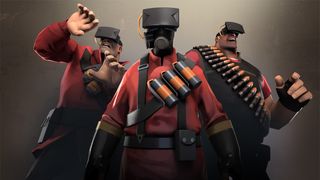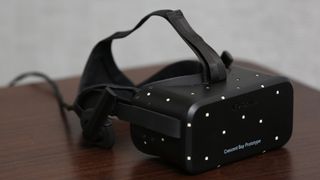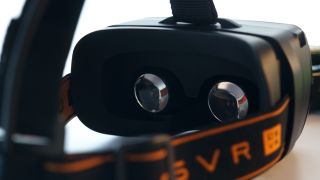
We expected Steam Machines out of Valve at GDC 2015, but this is much bigger news: Valve's getting into the VR hardware game. Next week, Valve will be showing off SteamVR. With the power of Steam behind it, Valve's virtual reality hardware will immediately be a serious challenger to the Oculus Rift.
Is that good? Bad? What do we hope for, and expect, out of SteamVR? The PC Gamer staff strapped on their virtual opinion headsets to think it over.
Phil: I've used an Oculus Rift, and it's pretty good. I'm not sure what I want from the VR experience except that, but a bit better. What I really want from Valve, then, is for them to not punish people for choosing someone else's hardware. I'd like for them not to announce that—say, for argument's sake—Ricochet 2 is locked down to Valve's hardware. I don't think it'll go down like that, but inevitably Valve will have some plan to make VR integration easier for developers. If that integration and support is specific to Valve's hardware, it'll potentially become the solution for developers on the fence about incorporating VR. I'd like Valve to make VR an easier and more attractive proposition for developers, but for the benefit of everyone who owns a VR headset—regardless of who made it.
I'd also quite like a virtual reality Half-Life 2 spin-off in which you play as one of those flying camera bots. You'd hover about City 17; enjoying Viktor Antonov's vision of dystopia, and also taking pictures of dissidents and trouble makers. That'd be neat.
Tom: Former special technology expert for Valve, Michael Abrash, kept a blog that explored the huge challenges that face VR hardware developers. Here he is addressing issues like screen judder, refresh rates and strobing at great length. Valve seem to be powerfully aware of the precise technological barriers that stand in the way of a great HD VR set, so it’s exciting to that they feel ready to show their proposed solution.
It’s also good to see some potentially serious competition emerging for the Oculus Rift. and not just from Valve. It looks like Nvidia will be introducing their own proprietary tech, and Sony have Project Morpheus. It’s true that separate insular devices could risk splitting the potential market for VR games, but it’s more important that the hardware is right before we start getting excited about our virtual reality future.

Tyler: As Tom and Phil raise, I both fear an Oculus monopoly and fear segmentation, where only certain games work on SteamVR and others on the Rift. My impression from speaking to devs over the past few years is that if you can make it work on a Rift, it isn’t any big stretch to make it work on similar VR hardware, and I hope that’s the case (though I really don’t have any deep technical knowledge of the complex stuff they’re doing).
The biggest gaming news, reviews and hardware deals
Keep up to date with the most important stories and the best deals, as picked by the PC Gamer team.
Otherwise, I’m not too concerned about the hardware. We’re starting to know what good VR feels like, and I think we can expect that Valve’s hardware will be at least as good as the latest Rift prototype we’ve demoed. What I really want to know is what kind of software they’re bringing—maybe there’s something we haven’t even thought to do with VR yet? Or maybe it’ll give me telekinetic powers. I’d be fine with that, too.
Evan: We expect so much from Valve, but it’s important to remember that all of Steam, Dota 2, CS:GO, TF2, this VR project, Steam Machines, SteamOS, and whatever else is happening inside the black box of a studio is being produced by about 300 people. 900 people worked on Assassin’s Creed IV. Not for the entire project, mind you, but that comparison hopefully gives some perspective: Valve isn’t a vast corporate behemoth.
My only hope for Valve’s project is that it doesn’t fragment the VR market too much. The last thing VR needs is a situation where anyone making a VR game needs to port it to multiple “platforms”—including Razer’s open-source crack at it, too.

Chris L: As resident VR skeptic, what I want is for Valve to announce: “Look, VR is pretty silly and we all know it. The average consumer is never going to buy an expensive computer they have to strap to their face, especially since they’ll need to already have another expensive computer just to run it. Basically, the only reason we’re even working on VR is that we have some smart people at Valve that we don’t want to lose to Oculus. VR is just our version of free soda in the breakroom: it keeps our people happy.”
Tim: I think that for anyone worried that Facebook buying Oculus might lead to the tech re-routed into some sort of virtual shopping sensorium (or, more likely, tri-dimensional colleagues’ holiday photos stalking sim), Valve committing to its own VR hardware can only be good news. Valve knows games, (he said, in the most obvious sentence ever written on this site), and I have to assume that their version of VR will be purely focused on pure gaming experiences, and making it as easy as possible for developers to create those. The nagging doubt, of course, is that Valve knows hardware design a lot less than it does software, and our initial impressions of the Steam controller were underwhelming. But hey, Valve also knows plenty about waiting until something’s right. As we’ll hopefully see next week.

Wes: The latest Oculus Rift headset, Crescent Bay, is incredible. But from people I’ve talked to who are in-the-know, the feeling of presence it creates, and the quality of the screen, are basically on par with the VR demo room Valve showed off more than a year ago. The big differences: Valve’s setup required a specially configured room, and was probably prohibitively expensive for a consumer headset. That’s Valve’s thing: it’s been researching VR hardware for years, but has said time and again it has no plans to sell it.
I fully believe in the brainpower of Valve’s R&D, but I have less faith in Valve’s business sense when it comes to hardware. They announced Steam Machines and the Steam controller, then bungled plans for a Steam Machine launch in 2014 and dramatically iterated on a controller prototype that just wasn’t right. What I want from SteamVR, more than anything, is for Valve to have a really good plan. Don’t announce it too early. Don’t show a sketchy prototype that turns out to be completely different hardware a year from now. Don’t try to corner exclusives for SteamVR, to the detriment of VR gaming at large. With a well-planned, confident hardware release that embraces the openness of the PC platform, SteamVR could be the final push virtual reality needs to reach critical mass. Make a mess of the release, and it takes VR just a little longer to take hold.
PC Gamer is the global authority on PC games—starting in 1993 with the magazine, and then in 2010 with this website you're currently reading. We have writers across the US, Canada, UK and Australia, who you can read about here.
Most Popular

